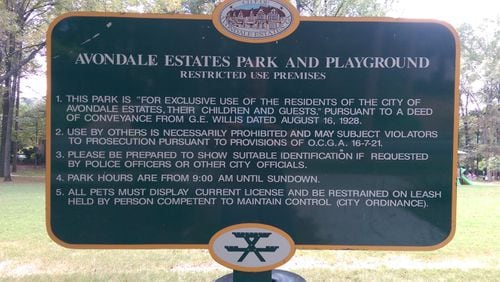Avondale Estates’ commission will begin taking steps to change language posted on the rules markers at Lake Avondale and Willis Park.
Before the rules can be changed, however, a new ordinance requiring three readings has to be passed. The first reading is 6:30 p.m. tonight at Avondale Estates City Hall, 21 N. Avondale Plaza.
Both lake and park list five rules with the sub heading “Restricted Use Premises.” The commission specifically wants to revise the first three rules with special focus on the first, which partly reads, “This park is ‘for exclusive use of the residents of the city of Avondale Estates, their children and guests …’ ”
City founder George Willis donated the park and lake to the city in the 1920s. His deed reads that “if the city fails to maintain and upkeep the property” it reverts back to Willis (who died in 1932) or his heirs. In no place does the deed suggest the property reverts if the city admits non-residents, which it’s done for decades.
Several residents attending a work session last week argued the language shouldn’t be touched because the deed “is part of our history” and the properties were “a gift to the city.” One resident read aloud her own personal revision of the rules, which included keeping the exclusivity rule, but moving it from the top to bottom of the list.
“With all due respect,” Mayor Jonathan Elmore told the audience, “we’re not going to do that. That language is not who we are, it doesn’t speak of who we are, and it shouldn’t be on there.”
About the Author






